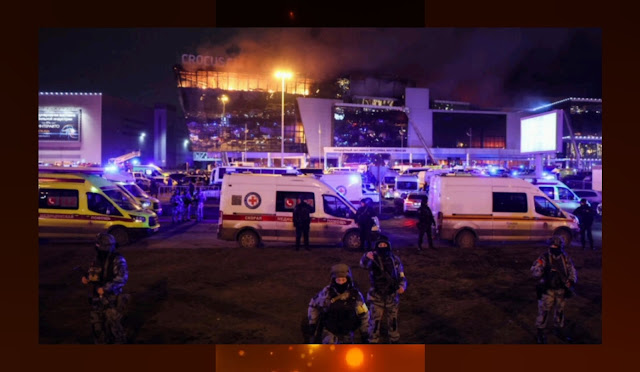Decoding the Moscow Attack: Unveiling the Culprits
In the aftermath of the devastating attack in Moscow, a critical question emerges: Who is responsible for this act of terror? While the Islamic State (IS) claims responsibility, suspicions fall on its branch known as the Islamic State Khorasan Province (ISKP).
IS has taken responsibility for the attack, hailing the "Islamic fighters" who perpetrated it. Many commentators and US officials have pointed fingers at the ISKP as the main suspect—although there is currently no evidence to support this.
The ISKP is a branch of IS in Afghanistan. The name stems from a region named by some local Islamic leaders, explicitly rejecting modern national borders while evoking what its members perceive as the lost glory and power of Muslim empires. It was formed at the peak of IS expansion in 2015, as the group attempted to build a network of affiliates across various regions.
The group has mainly focused its attacks on local campaigns until recently. However, it has launched hundreds of attacks on civilian targets and security forces, including Western forces, in Afghanistan. Two attacks in 2020 targeted a maternity ward and a university in Kabul, while others targeted mosques and ethnic or religious minorities in the country.
But is the ISKP now targeting international targets? To some extent. The group has targeted Tajikistan and Pakistan, neighboring Afghanistan, as well as a hotel in Afghanistan favored by Chinese nationals. Earlier this year, the US intercepted communications confirming the group's involvement in twin bombings in Iran that killed nearly 100 people—although the ISKP did not claim responsibility.
Earlier this month, the highest-ranking US general in the Middle East said the ISKP could target US and Western interests outside Afghanistan "in as little as six months and with little to no warning."
Why would the ISKP launch such an attack? Over the past few decades, many extremist Islamist factions have shifted their focus from purely local targets to international ones. Reasons vary from group to group. Sometimes, a new leader brings a personal agenda, while other times launching long-range international attacks is seen as a way to attract new recruits or win resources from sponsors. It is also possible that the ISKP is acting on direct orders from IS leaders.
IS leaders, like many Islamic militants, are mindful of Russian support for the regime of Bashar al-Assad in Syria and perceive Moscow as part of the broader coalition of Christian or Western forces against Islam. In September 2022, ISKP militants claimed responsibility for a deadly suicide bombing at the Russian embassy in Kabul, and some experts say the group has opposed Russian President Vladimir Putin in recent years.
ISKP leaders may also see Russia, along with China and others, as important to the continued rule of the Taliban and seek to undermine them. An attack in Moscow would thus combine local and more global agendas.

